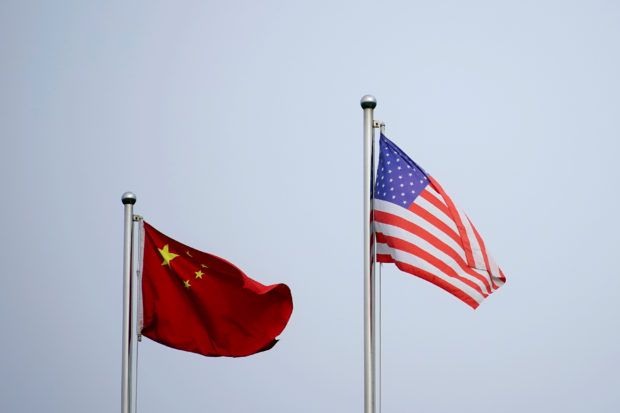
Chinese and U.S. flags flutter outside a company building in Shanghai, China. File photo/ REUTERS/Aly Song
WASHINGTON – Chinese investors roughly doubled the number of applications they made last year seeking U.S. regulatory clearance for proposed stakes in American companies, according to a new Treasury Department report released on Tuesday.
The annual report for the Committee on Foreign Investment in the United States (CFIUS), first reported by Reuters, shows that Chinese investors filed 44 so-called “covered notices” seeking green lights for their deals in U.S. President Joe Biden’s first year in office compared with 17 such filings in 2020.
The 2021 figures for China included filings from Hong Kong-based investors, while the 2020 numbers place Hong Kong’s three such filings into a separate category, due to a shift in U.S. policy.
Most foreigners seeking to take even non-controlling stakes in U.S. companies must seek approval from CFIUS, a powerful Treasury-led committee that reviews transactions for national security concerns and has the power to block them.
CFIUS in 2021 reviewed a record 272 “covered notices” for transaction approvals, up sharply from 187 in 2020 and 236 in 2019, the report showed, with the greatest concentration in finance, information and services and manufacturing.
CFIUS opened 130 investigations, compared with 88 last year. The report said that 72 transaction notices were withdrawn, with 63 refiled with changes aimed at mitigating any concerns.
A Treasury official said that part of the increase in filings was due to such withdrawals and refilings, along with increased case complexity that results in more refilings to allow greater engagement by CFIUS to resolve security issues.
The increase in filings also coincides with stronger market appetite for deals as the pandemic eased last year, said Nicholas Klein, a lawyer at DLA Piper who works on CFIUS cases.
“The big surprise is Chinese investors’ willingness to test the waters with CFIUS with over twice as many filings in 2021 compared to 2020,” Klein said.
China also made up the largest share of “covered notices” among all countries, accounting for 16.5% of the total, followed by Canada and Japan at 10.3% and 9.6%, respectively.
The committee, whose powers were dramatically expanded under a 2018 law, was used by former President Donald Trump to upend many Chinese investments in the United States.
“The willingness to negotiate robust mitigation is an indication of the Biden administration’s more nuanced approach to the balance between addressing national security risks and allowing foreign investment, including from China,” Klein added.
But Chinese investors only sought 10 investments in critical sectors including technology, infrastructure and data businesses in 2021, behind Britain, Japan, South Korea, the Cayman Islands and Israel.
Treasury Assistant Secretary for Investment Security Paul Rosen said in a statement that the department was taking “important and necessary measures to safeguard national security while also quickly clearing benign investments.”
He said CFIUS also is proactively identifying more non-notified transactions, including complex deals involving data.
Before the 2018 law known as FIRRMA required filings and reviews for more types of transactions, including minority stake purchases by foreigners, China accounted for most investments in American critical technology in the 2016-2017 period, accounting for more than a fifth of the total.